opens in a new window
Tor Essentials presents new editions of science fiction and fantasy titles of proven merit and lasting value, each volume introduced by an appropriate literary figure.
Far from Earth, two sister planets, Saint Anne and Saint Croix, circle each other in an eternal dance. It is said a race of shapeshifters once lived here, only to perish when men came. But one man believes they can still be found, somewhere in back of the beyond.
In The Fifth Head of Cerberus, Gene Wolfe skillfully interweaves three bizarre tales to create a mesmerizing pattern: the harrowing account of the son of a mad genius who discovers his hideous heritage; a young man’s mythic dreamquest for his darker half; and the bizarre chronicle of a scientist’s nightmarish imprisonment. Like an intricate, braided knot, the pattern at last unfolds to reveal astonishing truths about this strange and savage alien landscape.
With a new introduction by O. Henry Award winning author Brian Evenson
Please enjoy this free excerpt of opens in a new windowThe Fifth Head of Cerberus by Gene Wolfe, on sale 11/8/22
1
When I was a boy my brother David and I had to go to bed early whether we were sleepy or not. In summer particularly, bedtime often came before sunset; and because our dormitory was in the east wing of the house, with a broad window facing the central courtyard and thus looking west, the hard, pinkish light sometimes streamed in for hours while we lay staring out at my father’s crippled monkey perched on a flaking parapet, or telling stories, one bed to another, with soundless gestures.
Our dormitory was on the uppermost floor of the house, and our window had a shutter of twisted iron which we were forbidden to open. I suppose the theory was that a burglar might, on some rainy morning (this being the only time he could hope to find the roof, which was fitted out as a sort of pleasure garden, deserted) let down a rope and so enter our room unless the shutter was closed.
The object of this hypothetical and very courageous thief would not, of course, be merely to steal us. Children, whether boys or girls, were extraordinarily cheap in Port-Mimizon; and indeed I was once told that my father who had formerly traded in them no longer did so because of the poor market. Whether or not this was true, everyone—or nearly everyone—knew of some professional who would furnish what was wanted, within reason, at a low price. These men made the children of the poor and the careless their study, and should you want, say, a brown-skinned, red-haired little girl or one who was plump or who lisped, a blond boy like David or a pale, brown-haired, brown-eyed boy such as I, they could provide one in a few hours.
Neither, in all probability, would the imaginary burglar seek to hold us for ransom, though my father was thought in some quarters to be immensely rich. There were several reasons for this. Those few people who knew that my brother and I existed knew also, or at least had been led to believe, that my father cared nothing at all for us. Whether this was true or not, I cannot say; certainly I believed it, and my father never gave me the least reason to doubt it, though at the time the thought of killing him had never occurred to me.
And if these reasons were not sufficiently convincing, anyone with an understanding of the stratum in which he had become perhaps the most permanent feature would realize that for him, who was already forced to give large bribes to the secret police, to once disgorge money in that way would leave him open to a thousand ruinous attacks; and this may have been—this and the fear in which he was held—the real reason we were never stolen. The iron shutter is (for I am writing now in my old dormitory room) hammered to resemble in a stif and oversymmetrical way the boughs of a willow. In my boyhood it was overgrown by a silver trumpet vine (since dug up) which had scrambled up the wall from the court below, and I used to wish that it would close the window entirely and thus shut out the sun when we were trying to sleep; but David, whose bed was under the window, was forever reaching up to snap of branches so that he could whistle through the hollow stems, making a sort of panpipe of four or five. The piping, of course, growing louder as David grew bolder, would in time attract the attention of Mr. Million, our tutor. Mr. Million would enter the room in perfect silence, his wide wheels gliding across the uneven floor while David pretended sleep. The panpipe might by this time be concealed under his pillow, in the sheet, or even under the mattress, but Mr. Million would find it.
What he did with those little musical instruments after confiscating them from David I had forgotten until yesterday; although in prison, when we were kept in by storms or heavy snow, I often occupied myself by trying to recall it. To have broken them, or dropped them through the shutter onto the patio below would have been completely unlike him; Mr. Million never broke anything intentionally, and never wasted anything. I could visualize perfectly the half-sorrowing expression with which he drew the tiny pipes out (the face which seemed to float behind his screen was much like my father’s) and the way in which he turned and glided from the room. But what became of them?
Yesterday, as I said (this is the sort of thing that gives me confidence), I remembered. He had been talking to me here while I worked, and when he left it seemed to me—as my glance idly followed his smooth motion through the doorway—that something, a sort of flourish I recalled from my earliest days, was missing. I closed my eyes and tried to remember what the appearance had been, eliminating any skepticism, any attempt to guess in advance what I “must” have seen; and I found that the missing element was a brief flash, the glint of metal, over Mr. Million’s head.
Once I had established this, I knew that it must have come from a swift upward motion of his arm, like a salute, as he left our room. For an hour or more I could not guess the reason for that gesture, and could only suppose it, whatever it had been, to have been destroyed by time. I tried to recall if the corridor outside our dormitory had, in that really not so distant past, held some object now vanished: a curtain or a windowshade, an appliance to be activated, anything that might account for it. There was nothing.
I went into the corridor and examined the floor minutely for marks indicating furniture. I looked for hooks or nails driven into the walls, pushing aside the coarse old tapestries. Craning my neck, I searched the ceiling. Then, after an hour, I looked at the door itself and saw what I had not seen in the thousands of times I had passed through it: that like all the doors in this house, which is very old, it had a massive frame of wooden slabs, and that one of these, forming the lintel, protruded enough from the wall to make a narrow shelf above the door.
I pushed my chair into the hall and stood on the seat. The shelf was thick with dust in which lay forty-seven of my brother’s pipes and a wonderful miscellany of other small objects. Objects many of which I recalled, but some of which still fail to summon any flicker of response from the recesses of my mind . . .
The small blue egg of a songbird, speckled with brown. I suppose the bird must have nested in the vine outside our window, and that David or I despoiled the nest only to be robbed ourselves by Mr. Million. But I do not recall the incident.
And there is a (broken) puzzle made of the bronzed viscera of some small animal, and—wonderfully evocative—one of those large and fancifully decorated keys, sold annually, which during the year of its currency will admit the possessor to certain rooms of the city library after hours. Mr. Million, I suppose, must have confiscated it when, after expiration, he found it doing duty as a toy; but what memories!
My father had his own library, now in my possession; but we were forbidden to go there. I have a dim memory of standing—at how early an age I cannot say—before that huge carved door. Of seeing it swing back, and the crippled monkey on my father’s shoulder pressing itself against his hawk face, with the black scarf and scarlet dressing gown beneath and the rows and rows of shabby books and notebooks behind them, and the sick-sweet smell of formaldehyde coming from the laboratory beyond the sliding mirror.
I do not remember what he said or whether it had been I or another who had knocked, but I do recall that after the door had closed, a woman in pink whom I thought very pretty stooped to bring her face to the level of my own and assured me that my father had written all the books I had just seen, and that I doubted it not at all.
…
My brother and I, as I have said, were forbidden this room; but when we were a little older Mr. Million used to take us, about twice a week, on expeditions to the city library. These were very nearly the only times we were allowed to leave the house, and since our tutor disliked curling the jointed length of his metal modules into a hire cart, and no sedan chair would have withstood his weight or contained his bulk, these forays were made on foot.
For a long time this route to the library was the only part of the city I knew. Three blocks down Saltimbanque Street where our house stood, right at the Rue d’Asticot to the slave market and a block beyond that to the library. A child, not knowing what is extraordinary and what commonplace, usually lights midway between the two, finds interest in incidents adults consider beneath notice and calmly accepts the most improbable occurrences. My brother and I were fascinated by the spurious antiques and bad bargains of the Rue d’Asticot, but often bored when Mr. Million insisted on stopping for an hour at the slave market.
It was not a large one, Port-Mimizon not being a center of the trade, and the auctioneers and their merchandise were frequently on a most friendly basis—having met several times previously as a succession of owners discovered the same fault. Mr. Million never bid, but watched the bidding, motionless, while we kicked our heels and munched the fried bread he had bought at a stall for us. There were sedan chairmen, their legs knotted with muscle, and simpering bath attendants; fighting slaves in chains, with eyes dulled by drugs or blazing with imbecile ferocity; cooks, house servants, a hundred others—yet David and I used to beg to be allowed to proceed alone to the library.
This library was a wastefully large building which had held government offices in the old French-speaking days. The park in which it had once stood had died of petty corruption, and the library now rose from a clutter of shops and tenements. A narrow thoroughfare led to the main doors, and once we were inside, the squalor of the neighborhood vanished, replaced by a kind of peeling grandeur. The main desk was directly beneath the dome, and this dome, drawing up with it a spiraling walkway lined with the library’s main collection, floated five hundred feet in the air: a stony sky whose least chip falling might kill one of the librarians on the spot.
While Mr. Million browsed his way majestically up the helix, David and I raced ahead until we were several full turns in advance and could do what we liked. When I was still quite young it would often occur to me that, since my father had written (on the testimony of the lady in pink) a roomful of books, some of them should be here; and I would climb resolutely until I had almost reached the dome, and there rummage. Because the librarians were very lax about reshelving, there seemed always a possibility of finding what I had failed to find before. The shelves towered far above my head, but when I felt myself unobserved I climbed them like ladders, stepping on books when there was no room on the shelves themselves for the square toes of my small brown shoes, and occasionally kicking books to the floor where they remained until our next visit and beyond, evidence of the staf’s reluctance to climb that long, coiled slope.
The upper shelves were, if anything, in worse disorder than those more conveniently located, and one glorious day when I attained the highest of all I found occupying that lofty, dusty position (besides a misplaced astronautics text, The Mile-Long Spaceship, by some German) only a lorn copy of Monday or Tuesday leaning against a book about the assassination of Trotsky, and a crumbling volume of Vernor Vinge’s short stories that owed its presence there, or so I suspect, to some long-dead librarian’s mistaking the faded V. Vinge on the spine for “Winge.” I never found any books of my father’s, but I did not regret the long climbs to the top of the dome. If David had come with me, we raced up together, up and down the sloping floor—or peered over the rail at Mr. Million’s slow progress while we debated the feasibility of putting an end to him with one cast of some ponderous work. If David preferred to pursue interests of his own farther down I ascended to the very top where the cap of the dome curved right over my head; and there, from a rusted iron catwalk not much wider than one of the shelves I had been climbing (and I suspect not nearly so strong), opened in turn each of a circle of tiny piercings—piercings in a wall of iron, but so shallow a wall that when I had slid the corroded cover plates out of the way I could thrust my head through and feel myself truly outside, with the wind and the circling birds and the lime-spotted expanse of the dome curving away beneath me.
To the west, since it was taller than the surrounding houses and marked by the orange trees on the roof, I could make out our house. To the south, the masts of the ships in the harbor, and in clear weather—if it was the right time of day—the whitecaps of the tidal race Sainte Anne drew between the peninsulas called First Finger and Thumb. (And once, as I very well recall, while looking south I saw the great geyser of sunlit water when a starcrosser splashed down.) To east and north spread the city proper, the citadel and the grand market and the forests and mountains beyond.
But sooner or later, whether David had accompanied me or gone of on his own, Mr. Million summoned us. Then we were forced to go with him to one of the wings to visit this or that science collection. This meant books for lessons. My father insisted that we learn biology, anatomy, and chemistry thoroughly, and under Mr. Million’s tutelage, learn them we did—he never considering a subject mastered until we could discuss every topic mentioned in every book catalogued under the heading. The life sciences were my own favorites, but David preferred languages, literature, and law; for we got a smattering of these as well as anthropology, cybernetics, and psychology.
When he had selected the books that would form our study for the next few days and urged us to choose more for ourselves, Mr. Million would retire with us to some quiet corner of one of the science reading rooms, where there were chairs and a table and room sufficient for him to curl the jointed length of his body or align it against a wall or bookcase in a way that left the aisles clear. To designate the formal beginning of our class he used to begin by calling roll, my own name always coming first.
I would say, “Here,” to show that he had my attention. “And David.”
“Here.” (David has an illustrated Tales From The Odyssey open on his lap where Mr. Million cannot see it, but he looks at Mr. Million with bright, feigned interest. Sunshine slants down to the table from a high window, and shows the air aswarm with dust.)
“I wonder if either of you noticed the stone implements in the room through which we passed a few moments ago?”
We nod, each hoping the other will speak.
“Were they made on Earth, or here on our own planet?”
This is a trick question, but an easy one. David says, “Neither one. They’re plastic.” And we giggle.
Mr. Million says patiently, “Yes, they’re plastic reproductions, but from where did the originals come?” His face, so similar to my father’s, but which I thought of at this time as belonging only to him, so that it seemed a frightening reversal of nature to see it on a living man instead of his screen, was neither interested, nor angry, nor bored; but coolly remote.
David answers, “From Sainte Anne.” Sainte Anne is the sister planet to our own, revolving with us about a common center as we swing around the sun. “The sign said so, and the aborigines made them—there weren’t any abos here.”
Mr. Million nods, and turns his impalpable face toward me. “Do you feel these stone implements occupied a central place in the lives of their makers? Say no.”
“No.”
“Why not?”
I think frantically, not helped by David, who is kicking my shins under the table. A glimmering comes.
“Talk. Answer at once.”
“It’s obvious, isn’t it?” (Always a good thing to say when you’re not even sure “it” is even possible.) “In the first place, they can’t have been very good tools, so why would the abos have relied on them? You might say they needed those obsidian arrowheads and bone fishhooks for getting food, but that’s not true. They could poison the water with the juices of certain plants, and for primitive people the most efective way to fish is probably with weirs, or with nets of rawhide or vegetable fiber. Just the same way, trapping or driving animals with fire would be more efective than hunting; and anyway stone tools wouldn’t be needed at all for gathering berries and the shoots of edible plants and things like that, which were probably their most important foods— those stone things got in the glass case here because the snares and nets rotted away and they’re all that’s left, so the people that make their living that way pretend they were important.”
“Good. David? Be original, please. Don’t repeat what you’ve just heard.”
David looks up from his book, his blue eyes scornful of both of us. “If you could have asked them, they would have told you that their magic and their religion, the songs they sang and the traditions of their people were what were important. They killed their sacrificial animals with flails of seashells that cut like razors, and they didn’t let their men father children until they had stood enough fire to cripple them for life. They mated with trees and drowned the children to honor their rivers. That was what was important.”
With no neck, Mr. Million’s face nodded. “Now we will debate the humanity of those aborigines. David negative and first.” (I kick him, but he has pulled his hard, freckled legs up be- neath him, or hidden them behind the legs of his chair, which is cheating.) “Humanity,” he says in his most objectionable voice, “in the history of human thought implies descent from what we may conveniently call Adam; that is, the original Terrestrial
stock, and if the two of you don’t see that, you’re idiots.”
I wait for him to continue, but he is finished. To give myself time to think, I say, “Mr. Million, it’s not fair to let him call me names in a debate. Tell him that’s not debating, it’s fighting, isn’t it?”
Mr. Million says, “No personalities, David.” (David is already peeking at Polyphemus the Cyclops and Odysseus, hoping I’ll go on for a long time. I feel challenged and decide to do so.)
I begin, “The argument which holds descent from Terrestrial stock pivotal is neither valid nor conclusive. Not conclusive because it is distinctly possible that the aborigines of Sainte Anne were descendants of some earlier wave of human expansion— one, perhaps, even predating The Homeric Greeks.”
Mr. Million says mildly, “I would confine myself to arguments of higher probability if I were you.”
I nevertheless gloss upon the Etruscans, Atlantis, and the tenacity and expansionist tendencies of a hypothetical technological culture occupying Gondwanaland. When I have finished Mr. Million says, “Now reverse. David, affirmative without repeating.”
My brother, of course, has been looking at his book instead of listening, and I kick him with enthusiasm, expecting him to be stuck; but he says, “The abos are human because they’re all dead.”
“Explain.”
“If they were alive it would be dangerous to let them be human because they’d ask for things, but with them dead it makes it more interesting if they were, and the settlers killed them all.”
And so it goes. The spot of sunlight travels across the blackstreaked red of the tabletop—traveled across it a hundred times. We would leave through one of the side doors and walk through a neglected areaway between two wings. There would be empty bottles there and wind-scattered papers of all kinds, and once a dead man in bright rags over whose legs we boys skipped while Mr. Million rolled silently around him. As we left the areaway for a narrow street, the bugles of the garrison at the citadel (sounding so far away) would call the troopers to their evening mess. In the Rue d’Asticot the lamplighter would be at work, and the shops shut behind their iron grilles. The sidewalks magically clear of old furniture would seem broad and bare.
Our own Saltimbanque Street would be very diferent, with the first revelers arriving. White-haired, hearty men guiding very young men and boys, men and boys handsome and muscular but a shade overfed; young men who made diffident jokes and smiled with excellent teeth at them. These were always the early ones, and when I was a little older I sometimes wondered if they were early only because the white-haired men wished to have their pleasure and yet a good night’s sleep as well, or if it were because they knew the young men they were introducing to my father’s establishment would be drowsy and irritable after midnight, like children who have been kept up too late.
Because Mr. Million did not want us to use the alleys after dark we came in the front entrance with the white-haired men and their nephews and sons. There was a garden there, not much bigger than a small room and recessed into the windowless front of the house. In it were beds of ferns the size of graves; a little fountain whose water fell upon rods of glass to make a continual tinkling, and which had to be protected from the street boys; and, with his feet firmly planted, indeed almost buried in moss, an iron statue of a dog with three heads.
It was this statue, I suppose, that gave our house its popular name of Maison du Chien, though there may have been a reference to our surname as well. The three heads were sleekly powerful with pointed muzzles and ears. One was snarling and one, the center head, regarded the world of garden and street with a look of tolerant interest. The third, the one nearest the brick path that led to our door, was—there is no other term for it— frankly grinning; and it was the custom for my father’s patrons to pat this head between the ears as they came up the path. Their fingers had polished the spot to the consistency of black glass.
Copyright © 2022 from Gene Wolfe
Pre-Order The Fifth Head of Cerberus Here:
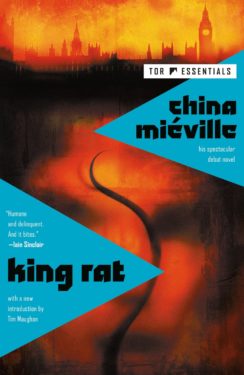 King Rat by China Mieville
King Rat by China Mieville Everfair by Nisi Shawl
Everfair by Nisi Shawl Knight’s Wyrd by Debra Doyle and James D. Macdonald
Knight’s Wyrd by Debra Doyle and James D. Macdonald Small Change by Jo Walton
Small Change by Jo Walton A Deepness in the Sky by Vernor Vinge
A Deepness in the Sky by Vernor Vinge

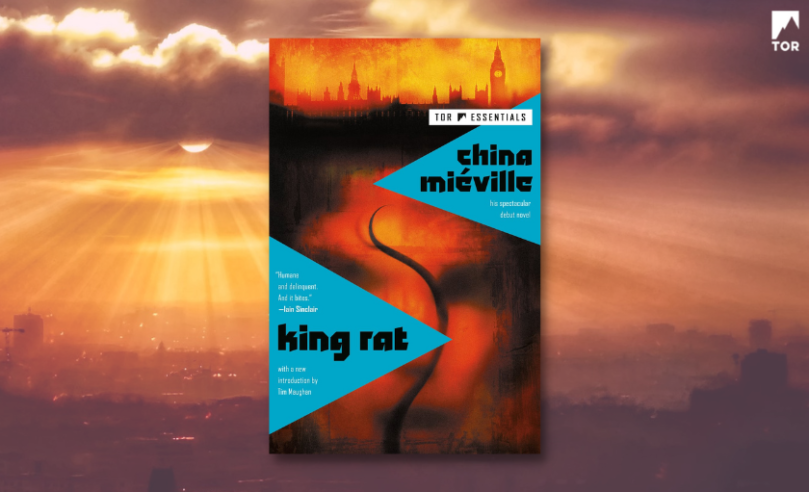





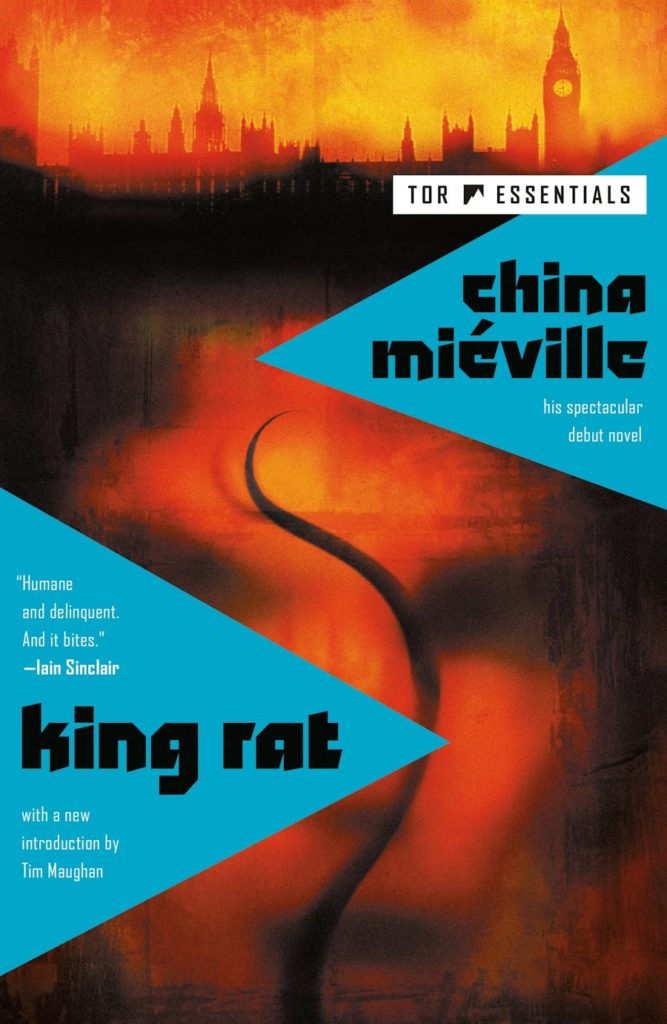
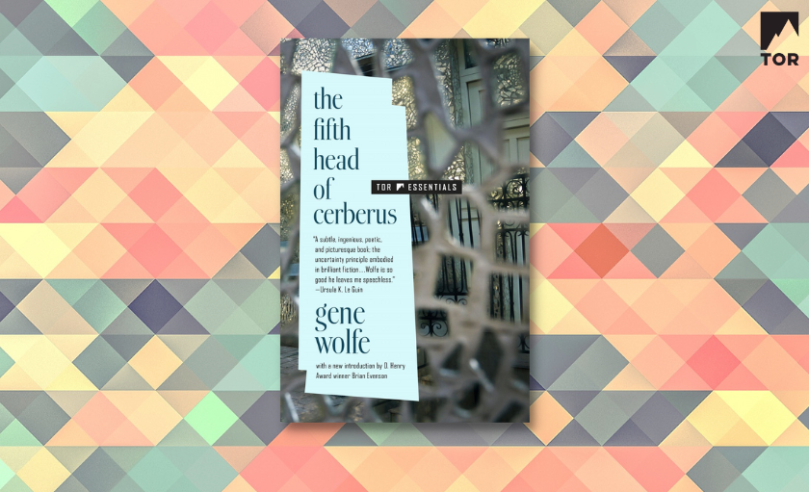


 The Black Company
The Black Company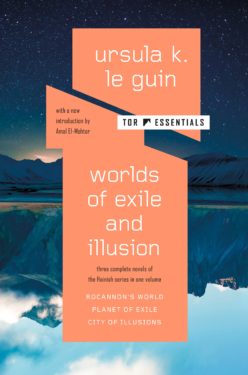 Worlds of Exile and Illusion
Worlds of Exile and Illusion Up Against It
Up Against It Mythago Wood
Mythago Wood Growing Up Weightless
Growing Up Weightless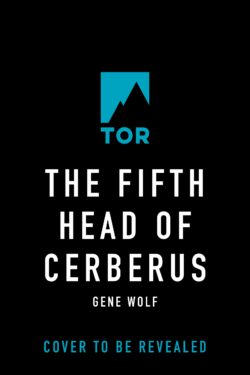 The Fifth Head of Cerberus
The Fifth Head of Cerberus
 The Wood Wife
The Wood Wife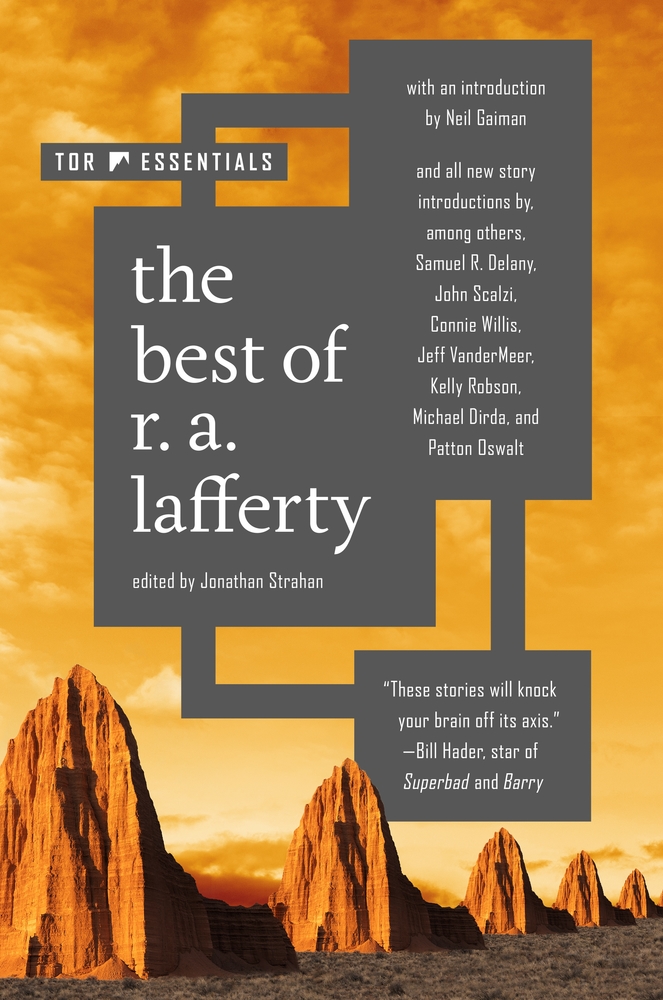
 Stand on Zanzibar
Stand on Zanzibar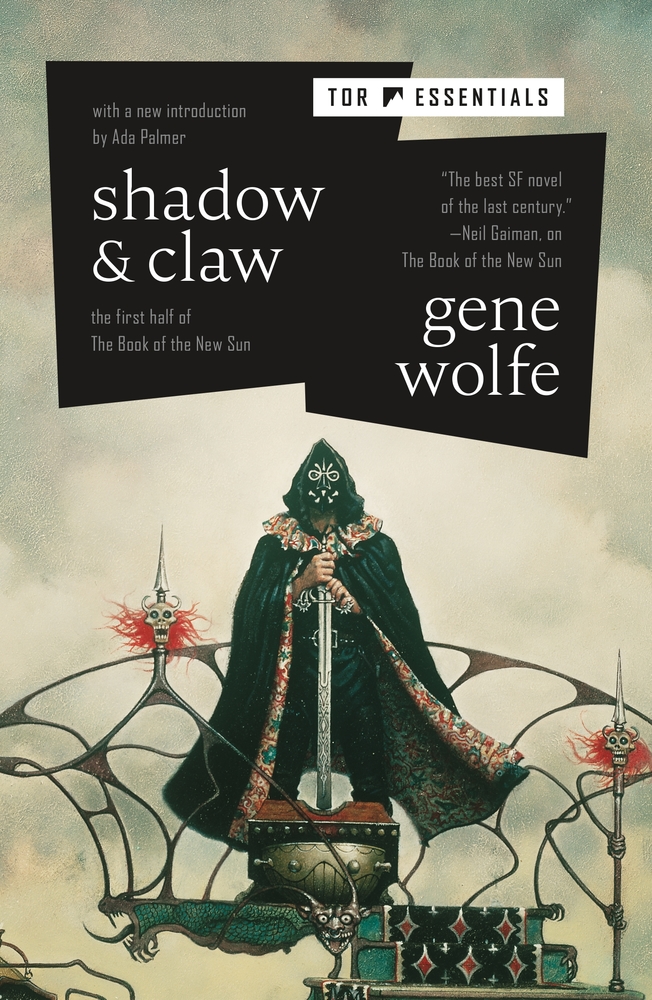 Shadow & Claw
Shadow & Claw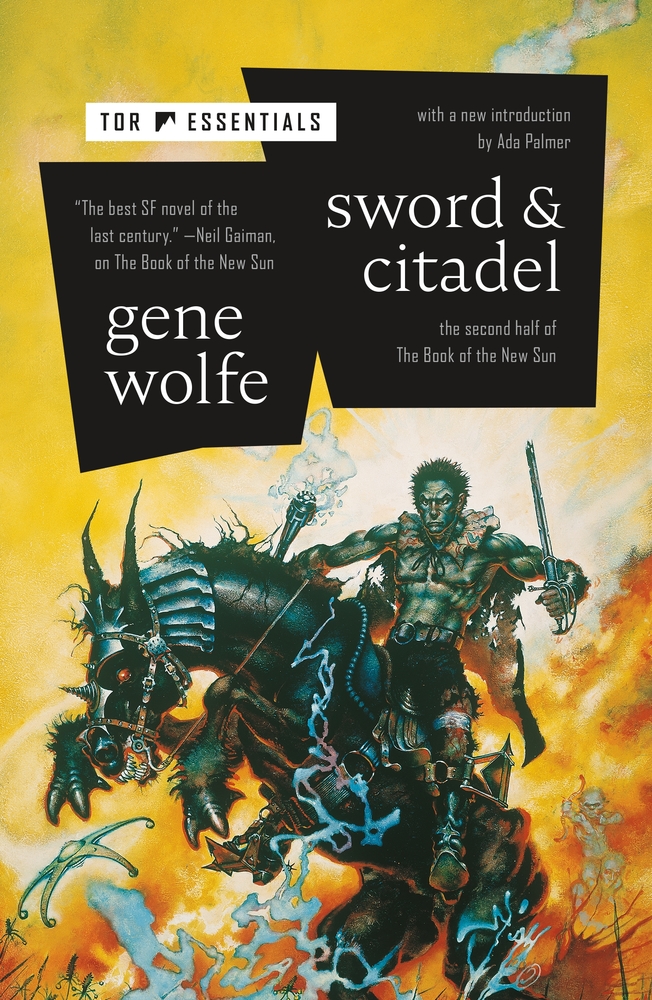
 Redshirts
Redshirts
 China Mountain Zhang
China Mountain Zhang Three Californias
Three Californias Among Others
Among Others
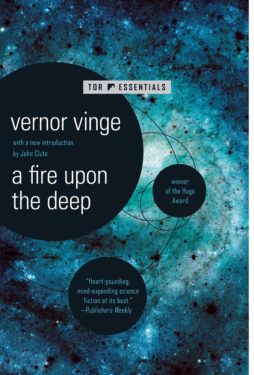 A Fire Upon the Deep
A Fire Upon the Deep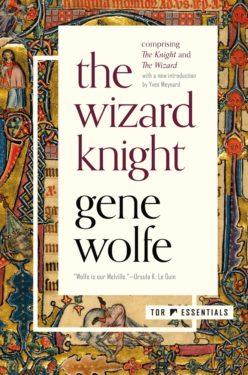 The Wizard Knight
The Wizard Knight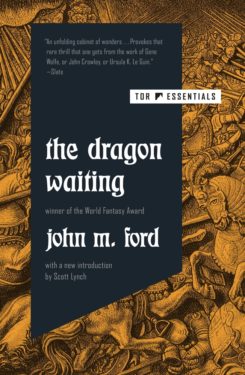
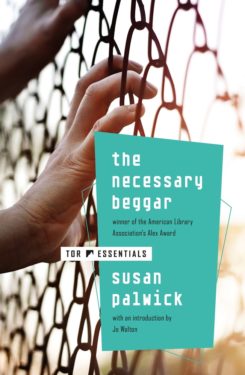 The Necessary Beggar
The Necessary Beggar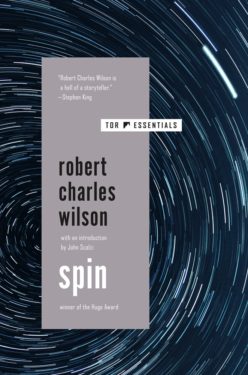 Spin
Spin